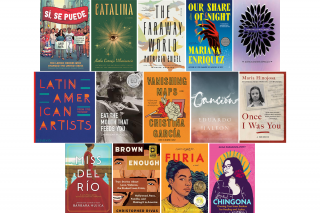Since 1968, the United States has honored Hispanic Heritage Month (September 15 through October 15) in celebration of the cultures, traditions, and diversity of Hispanic Americans with ancestral roots in Spain and numerous Latin American countries and territories. Historically, September 15 marks the anniversary of independence from Spain for Costa Rica, Nicaragua, El Salvador, Honduras, and Guatemala, whereas September 16 and September 18 commemorate the independence of Mexico and Chile, respectively. To commence the celebration at Simmons, we have compiled a Latinx reading list of novels, short stories, memoirs, historical fiction, graphic histories, scholarly monographs, and poetry collections.
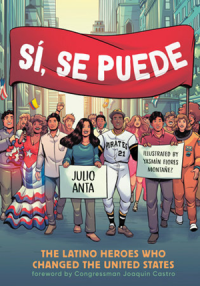
Julio Anta and illustrator Yasmín Flores Montañez, Sí, Se Puede: The Latino Heroes Who Changed the United States (Ten Speed Graphic/Penguin Random House, 2023). This colorful graphic history, which includes a foreword by Congressman Joaquin Castro, showcases how Latinx individuals have shaped every aspect of American life. The book revolves around a group of Hispanic Americans who embark on an interactive museum tour to encounter the Latinx luminaries that they may not have encountered in their classroom curriculum. Profiled individuals include César Chávez, Dolores Huerta, Ellen Ochoa, Alexandria Ocasio-Cortez, and more. The book’s title (“Yes, We Can” in English), is the motto of the United Farm Workers.
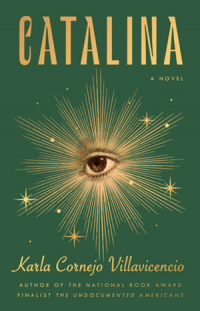
Carla Cornejo Villavicenio, Catalina: A Novel (New York: One World/Penguin Random House, 2024). This national bestseller follows the protagonist Catalina, who is a Latin American immigrant raised by her undocumented grandparents. She gets accepted to Harvard University, where she is exposed to the institution’s elite subcultures (literary organizations, elegant parties, secret societies). As graduation looms, Catalina fears that this environment has no place for the undocumented. According to Time magazine, “With Catalina, Villavicencio draws from her own experience as an undocumented person and Harvard grad to give voice to a fierce, but vulnerable character.”

Patricia Engle, The Faraway World: Stories (Avid Reader Press/Simon & Schuster, 2024). In this collection, Engle (Associate Professor of Creative Writing, University of Miami), offers ten haunting short stories. Set in a variety of locations (Cuba, Colombia, the United States, etc.), these tales wrestle with the themes of migration, sacrifice, regret, and moral compromise. For The New York Times, “all the characters have astonishingly complex relationships to places they’ve never seen or haven’t been to in many years, since they emigrated to another place. . . . [This collection] is about the Latin American diaspora, but it’s also one that proves how Engel, like one of her characters, is capable of noticing that between any two people, ‘a look reveals more than a fingerprint.’”

Mariana Enríquez, Our Share of Night, trans. Megan McDowell (New York: Hogarth/Penguin Random House, 2023). In her first book to be translated into English, Argentine author Mariana Enriquez incorporates Latinx experience into a Gothic/horror genre. Following the tragic death of their beloved wife and mother, a father and son travel to the deceased’s ancestral homeland. During their journey, they encounter a maniacal cult, Argentina’s military dictatorship, and specters of the occult. Our Share of Night was among TheNew York Times’ Ten Best Horror Books of the Year. Elle magazine praises the book as “wicked, wise, and stuffed with supernatural intrigue . . . a mighty feat of creative prowess.”

Joshua Jennifer Espinoza, There Should Be Flowers (Fairfax, VA: Civil Coping Mechanisms, 2016). In this poetry collection, J. Jennifer Espinoza, a self-identified transgender woman, explores mental illness, love, grief, and beauty. With her unapologetic and intimate style, Espinoza explores both the beauty and the need to validate one’s existence that accompany being trans. The Coal Hill Review calls this collection “an unyielding call for compassion in a world that continuously tries to suppress the voices of marginalized groups.”
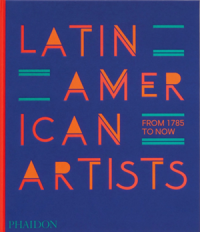
Raphael Fonseca, Latin American Artists: From 1785 to Now (New York: Phaidon, 2023). In this scholarly work, the Denver Art Museum’s Curator of Latin American Art introduces key works of visual art by 308 artists from 20 Latin American countries. Fonseca focuses on the vibrant history and aesthetics of Latin American art, as well as its growing international prominence in today’s art scene. Endorsing this book, Latin Media writes, “Want a stunning coffee table book that will also educate you on important Latinx creatives? Then you need to pick up Phaidon’s impressive Latin American Artists.”
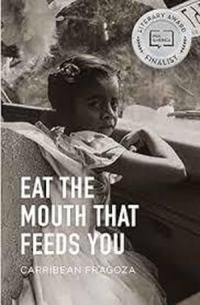
Carribean Fragoza, Eat the Mouth that Feeds You (San Francisco: City Lights Publishers, 2021). In this Whiting Award-winning debut collection of stories, Fragoza develops imperfect yet sympathetic Latinx and Chicanx characters who struggle against a system aligned against them. In particular, these portrayals show how women’s wisdom emerges from the crucible of violence erupting along the U.S.-Mexico border. A New York Journal of Books reviewer writes: “There is more feminist subtext here than there is displacement angst, a fitting language and tone for the current state of women’s issues, all the black humor, the irony, and stranger-than-fiction scenarios right at home here among the fairy tales gone wrong and the fables exposed for the patriarchal propaganda they always were. . . . What you can call it, is genius.”

Christina García, Vanishing Maps (New York: Vintage/Penguin Random House, 2024). In this sequel to Dreaming in Cuban (Alfred A. Knopf/Penguin Random House, 1992), García traces four generations of a Cuban family’s history, often from the perspective of matriarch Celia del Pino. Her descendants navigate transnational identities in locations as diverse as Los Angeles, Berlin, and Moscow. The novel explores the themes of family, queerness, isolation, and homecoming. According to the Washington Independent Review of Books, “Not only is García a masterful writer, effortlessly weaving together multiple narrative strands, she also demonstrates a remarkable facility for languages, switching from English to Spanish to Russian to German with ease . . . Vanishing Maps is, at heart, a book about family, yet it’s also about geography, culture, and language. There is something for everyone in its pages.”

Eduardo Halfon, Canción (New York: Bellevue Literary Press, Spanish ed. 2021; English ed. 2022). Originally published in Spanish, the Berman Literary Prize-winning Canción follows the journey of a contemporary writer whose father was abducted by Guatemalan guerillas decades earlier. Reconstructing and intermingling Jewish, Japanese, and Latin American history, this novel probes the complexity of diasporic identities. Kirkus Reviews describes Halfon’s oeuvre as “slender but deceptively weighty books, which are at once breezy and melancholic, bemused and bitter, he opens up worlds to readers in return.”

Maria Hinojosa, Once I Was You: A Memoir (New York: Atria Books/Simon & Schuster, 2021). In this memoir, Emmy Award-winning journalist and anchor Maria Hinojosa shares her experience of growing up as a Mexican-American in Chicago’s South Side. Her personal narrative reveals how the United States subjects immigrants to discrimination and exploitation. It also testifies to one’s will to survive. In Gloria Steinem’s words, “Anyone striving to understand and improve this country should read her story.”

Bárbara Mujica, Miss del Río: A Novel of the First Major Latina Star in Hollywood (New York: HarperCollins, 2022). Told through the voice of a Mexican hairdresser in 1910, this historical novel recounts the life of Dolores del Río, a Latina movie star sensation. The narrative arc depicts her rise to fame in Hollywood, personal struggles, and Mexican pride. The New York Times writes that “Bárbara Mujica dazzles us . . . She takes us on a journey through an era of wars and movies, and unforgettable characters that made Hollywood what it is today.”

Christopher Rivas, Brown Enough: True Stories About Love, Violence, the Student Loan Crisis, Hollywood, Race, Familia, and Making It in America (New York: Simon & Schuster/Row House Publishing, 2022). Rivas’s memoir weaves a multifaceted story of being Brown, punctuated by ambition, scandal, Whitewashing, and bad Spanish. In doing so, he presents an expansive and inclusive perspective on race in America. For actor John Leguizamo, “Brown Enough is a celebration of Brownness and a manifesto about the magic, beauty, and heartbreak that comes with being Brown in America. Brownness is more than our skin color or language or where we grew up; it’s also about the common threads that connect us all.”

Yamile Saied Méndez, Furia (New York: Algonquin Young Readers/Hachette Book Group, 2020). This young adult novel, which won the Pura Belpré Award Medal for Young Adult Narrative (2021), revolves around the protagonist Camila, a teenage fútbol player from Argentina who must hide her athletic ambition from disapproving parents. She plays her sport in secret while struggling with injury, sexism, and familial conflicts. According to Publishers Weekly, “Méndez crafts a dynamic, feminist narrative that commands attention from the very first line. At its core, this novel is a full-hearted love letter to Argentina and ‘incorrigible girls’ everywhere, emboldening readers to stand up for themselves and chase the dreams they hold dear.”

Alma Zaragoza-Petty, Chingona: Owning Your Inner Badass for Healing and Justice (Minneapolis: Broadleaf Books, 2022). In this feminist manifesto, Mexican-American activist, scholar, and podcast host Alma Zargoza-Petty urges readers to claim their inner chingona, the Spanish equivalent of “badass.” For Brown women in particular, being a chingona enables them to transform their pain and trauma into survival and perseverance. University of California, Los Angeles Professor Robert Chao Romero writes that Zaragoza-Petty “offers a brave and rare testimonio of the Chicana/Latina experience. Incorporating the best of Chicanx Studies and CRT [Critical Race Theory] in education, she captures the struggle of so many of our sisters.”

